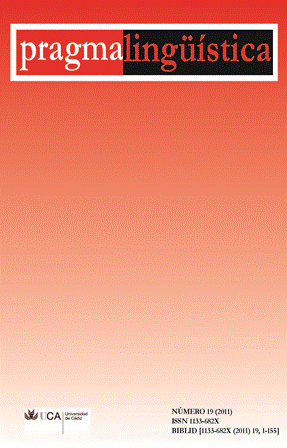The effectiveness of a mixed methodology implemented in a Beginner’s Spanish Course to develop the four language skills: a quasi-experimental study

Additional Files
DOI
https://doi.org/10.25267/Pragmalinguistica.2011.i19.04Info
Abstract
This present article seeks to provide a mixed methodological model for the development and implementation of a Teaching Module for Spanish as a Foreign Language in the face-to-face environment. The primary objective is to portray how methodological principles from different language teaching approaches (such as task based language teaching and cooperative learning) can be combined effectively in designing activities for face-to-face contexts. In this regard, empirical evidence is analysed in order to determine the effectiveness of the mixed methodology in the teaching-learning of Spanish as a Foreign Language in the said settings, in a study based on a longitudinal experimental design with pre-test and post-test, but without control group. The results show an increase in the acquisition of specific knowledge in Spanish as a Foreign Language. It is therefore proposed that mixed methodological models be integrated and implemented when designing Teaching Modules for Language Learning, since they are the most suitable for Second and Foreign Language Acquisition.
Keywords
Downloads
How to Cite
License
Copyright (c) 2018 Pragmalingüística

This work is licensed under a Creative Commons Attribution-NonCommercial-ShareAlike 4.0 International License.
References
AUSTIN, J. (1964): Sense and Sensibilia. Oxford: Oxford University Press.
BARTHOLOMÉ, A. (1995): “Algunos modelos de enseñanza para los nuevos canales”, Cabero, J. y Martínez, F. (coords.): Nuevos canales de comunicación en la enseñanza, Madrid: Centro de Estudios Ramón Areces, pp. 119-141.
BREEN, M. (1987): “Learner Contributions to Task Design”, Candlin, C. y Murphy, D. (eds.): Language Learning Tasks, Eaglewood Cliffs N. J.: Prentice Hall International, pp. 23-46.
ELLIS, R. (2003): Task-Based Language Learning and Teaching. Oxford: Oxford University Press.
ESTAIRE, S. (2004-2005): La enseñanza de lenguas mediante tareas: principios y planificación de unidades didácticas, Madrid: Universidad Antonio de Nebrija.
ESTAIRE, S. y ZANÓN, J. (1990): “El diseño de unidades didácticas para la enseñanza de una segunda lengua”, Comunicación, lenguaje y educación, 7-8, pp. 55-90.
ESTAIRE, S. y ZANÓN, J. (1994): Planning Classwork: A Task-Based Approach, Oxford: Heinemann.
FATHMAN, A. K. y KESSLER, C. (1993): “Cooperative Language Learning in School Contexts”, Annual Review of Applied Linguistics, 13, pp. 127-140.
FIRTH, J. (1957): Papers in Linguistics 19341951, London: Oxford University Press.
GERMANY GERMANY, P. y FERREIRA CABRERA, A. (1999). Evaluación de Competencia Comunicativa en Español como Lengua Extranjera, Concepción: Universidad de Concepción.
GUMPERZ, L. (1979): “The Communicative Competence of Bilinguals”, Language in Society, 1-1, pp. 143-154.
HALLIDAY, M.A.K. (1985): Spoken and written language, Oxford: Oxford University Press.
HYMES, D. (1964): Language in Culture and Society, New York: Harper and Row.
KRASHEN, S. D. (1987): Principles and practice in second language acquisition, London: Prentice-Hall.
LABOV, W. (1980): Locating Language in Time and Space, New York: Academic Press.
LEE, J. (2000): Tasks and Communicative Language Classrooms, Boston: McGrawHill.
LIGHTBOWN, P. (1992). “Can they do it themselves? A comprehension-based ESL course for young children”, Courchene, R., John, J. ST., Thierren, C. y Glidden, J. (eds.): Comprehensionbased Language Teaching: Current Trends, Ottawa: University of Ottawa Press.
LIVINGSTONE, K. A. (2008): La Efectividad de un Modelo Metodológico Mixto para la Enseñanza-Aprendizaje de Español como Lengua Extranjera, Chile: Universidad de Concepción.
LIVINGSTONE, K. A. (2009): Implementación de un modelo metodológico mixto para la enseñanza-aprendizaje de español como LE, München: LINCOM GmbH.
LIVINGSTONE, K. A. y FERREIRA, A. (2009): “La efectividad de un modelo metodológico mixto para la enseñanza-aprendizaje de español como LE”, Boletín de Filología, 44-2, pp. 89-118.
LIVINGSTONE, K. A. (2010a): “Empirical study: a mixed methodology to improve linguistic and communicative competence in Spanish as a FL/SL”, Entrehojas - Revista de Estudios Hispánicos, 1(1), pp. 1-38.
LIVINGSTONE, K. A. (2010b): Los procesos metodológicos de la enseñanza-aprendizaje de lenguas mediante tareas, München: LINCOM GmbH.
LIVINGSTONE, K. A. (2010c): El diseño de cursos de lenguas basados en tareas. München: LINCOM GmbH.
LIVINGSTONE, K. A. (2011): “The evaluation of a mixed methodological model to improve the productive and receptive skills in Spanish as a FL/SL: an experimental study”, Baraton Interdisciplinary Research Journal, 1-1, pp. 38-49.
MORENO, B. (coord.) (1997): Experto en Enseñanza del Español como Lengua Extranjera: Historia de la Metodología de Lenguas Extranjeras, con referencia al español, Madrid: Fundación Antonio de Nebrija.
OLSEN, R. y KAGAN, S. (1992): “About Cooperative Learning”, Kessler, C. (ed.): Cooperative Language Learning: A Teacher’s Response Book, New York: Prentice Hall, pp. 1-30.
RICHARDS, J.C. y RODGERS, T. S. (2001): Approaches and Methods In Language Teaching, London: Cambridge Language teaching Library.
ROCA, J., VALCÁRCEL, M. y VERDÚ, M. (1990): “Hacia un nuevo paradigma en la enseñanza de idiomas modernos: el Enfoque por Tareas”, Revista Interuniversitaria de Formación de Profesorado, 8, pp. 25-46.
SEARLE, J. (1985): The Philosophy of Language, New York: Oxford University Press.
SHEEN, R. (1994): “A critical analysis of the advocacy of the task-based syllabus”, TESOL Quarterly, 28, pp. 127-57.
SKEHAN, P. (1998): A cognitive approach to language learning, Oxford: Oxford University Press.
TRUJILLO SÁEZ, F. (2002): “Aprendizaje Cooperativo para la enseñanza de la lengua”, Publicaciones de la Facultad de Educación y Humanidades 32, pp. 147-162.
WILLIS, J. (1996): A framework for taskbased learning, Harlow: Longman.
WILLIS, D. y WILLIS, J. (2007): Doing task-based teaching, Oxford: Oxford University Press.
ZANÓN, J. (coord.) (1999): La Enseñanza del Español mediante Tareas, Madrid: Edinumen.






